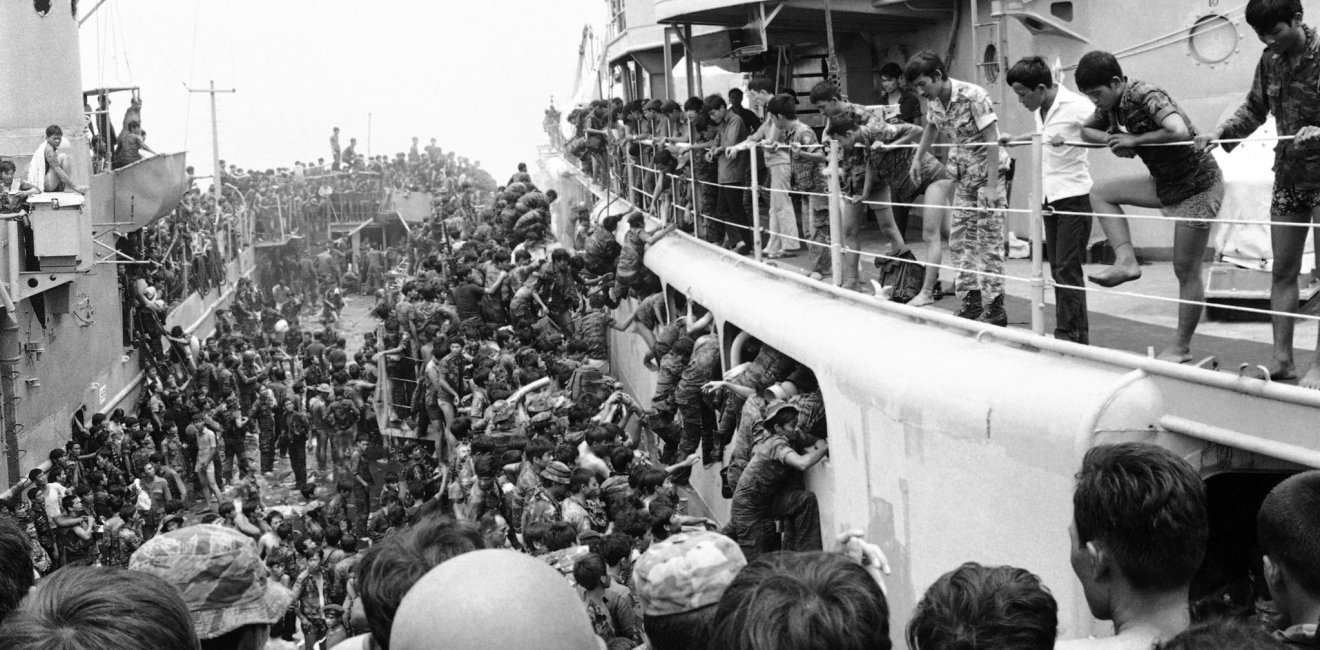
A blog of the History and Public Policy Program
Six additional sources on the end of the Vietnam War added to DigitalArchive.org
While compiling the document collection for CWIHP Working Paper #84, “The Return to War: North Vietnamese Decision-Making, 1973-1975,” we discovered that, in 2008, the Vietnamese had published a second edition of a very significant primary source: the Historical Chronicle of the Cochin China Party Committee and the Central Office for South Vietnam, 1954-1975 (Lich Su Bien Nien Xu Uy Nam Bo va Trung Uong Cục Mien Nam [1954-1975]), or the “COSVN Chronicle.”
Although the Van Kien Dang (Collected Party Documents) and the Lich Su Khang Chien Chong My, Cuu Nuoc 1954-1975 (History of the Resistance War Against the Americans to Save the Nation, 1954-1975) remain, respectively, the most vital primary and secondary series, the COSVN Chronicle is undoubtedly the most important single volume communist primary document collection available.
Shortly after publication of “Return to War,” we acquired a copy of the second edition from Vietnam. Upon review, we discovered that the revised volume—a massive 1,500 pages—included over 300 new documents not included in the original work published in 2002. The introduction to the 2008 edition says that the following changes were made:
Sources of information on events were corrected or made more precise and a number of events were eliminated. These new entries were the result of new information that was found in the archives of the Party Central Committee, the Ministry of Defense’s Central Archives, the archives of the Party History Institute, and the archives of the Military History Institute of Vietnam.
These changes include the deletion of multiple documents in the new edition that were in the first volume. In several cases the new edition provided different dates, mostly differences of one day, but in one case the difference is exactly one month, suggesting that perhaps the date given in the earlier edition was a misprint.
Moreover, several paragraphs in an entry in the old edition have been omitted, and there were slight changes in summaries and in the titles of some entries. Unfortunately, researchers will probably have to acquire both volumes to ensure no changes to a specific document were made from one volume to the next.
We’ve translated and edited six additional documents from the second edition for the 1973-1974 timeframe. The notations at the end of each translation refer to the filing locations for each folder containing the released document. The documents are now accessible at DigitalArchive.org in the collection “North Vietnamese Decision-making, 1973-1975,” along with the 80 files from our earlier Working Paper.
Oddly, there were no new noteworthy documents from 1975. For that year, virtually the only additions for the second edition are from the 1975 volume of Collected Party Documents series.
Additionally, the second edition contains three new appendixes. We did not include them here, but scholars may wish to know that they include:
- The COSVN table of organization.
- Code names of organizations, locations, and individuals.
- Summary bios of the Secretaries and Deputy Secretaries of COSVN and of the Cochin China Party Committee.
We hope these new documents add insights into Vietnamese Communist planning and decision-making during this crucial timeframe:
- 25 May 1973: COSVN Party Current Affairs Committee Issues Information Bulletin No. 06/TT 73 on the Le Duc Tho-Kissinger Talks (17 to 22 May 1973)
- 11 January 1974: COSVN Party Current Affairs Committee Policy of Maintaining Good Relations with Cambodia In the New Situation
- 6 March 1974: COSVN Party Current Affairs Committee Guidance on Strengthening Vietnamese-Cambodian Relations and Combat Solidarity
- 18 September 1974: Politburo Sends Letter to COSVN, Region 5, Tri-Thien, Saigon, Hue, and Danang
- 20 September 1974: COSVN Party Current Affairs Committee Provides Guidance to Shape the Struggle Movement in South Vietnam’s Cities
- 19 October 1974: COSVN Party Current Affairs Committee Provides Guidance for the Political Struggle in the Cities of South Vietnam for the Final Days of 1974
Authors

History and Public Policy Program
A leader in making key foreign policy records accessible and fostering informed scholarship, analysis, and discussion on international affairs, past and present. Read more


Cold War International History Project
The Cold War International History Project supports the full and prompt release of historical materials by governments on all sides of the Cold War. Read more

Explore More in Sources and Methods
Browse Sources and Methods
Energy and the Fall of Détente

Kissinger, Dobrynin, and the End of the Vietnam War


